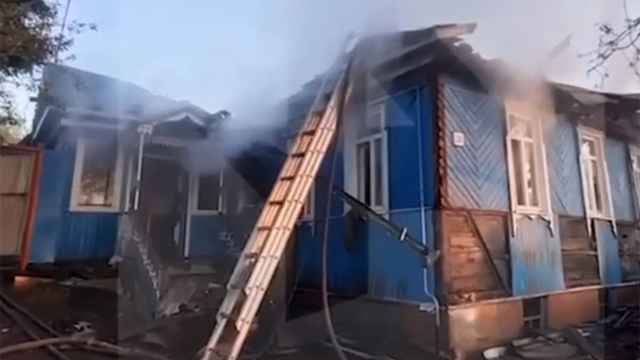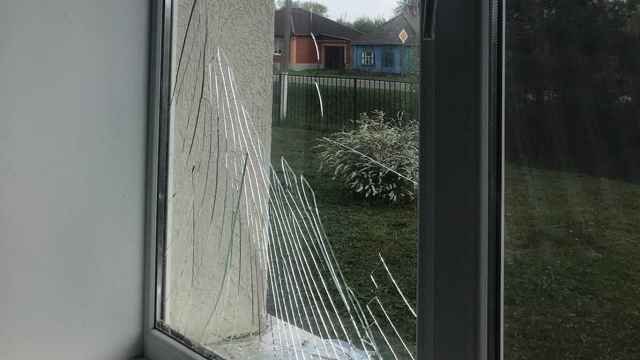The violation of Polish airspace with Russian drones on the night of Sept. 9-10 is one of the most straightforward examples of how the West is already experiencing direct Russian aggression. At the same time, the intrusion was accompanied by a coherent, multi-layered Russian information operation conducted by the Kremlin’s disinformation apparatus both domestically and abroad.
This approach represents Moscow’s typical mode of operation, where it concurrently utilizes a range of hybrid methods: physical attacks — frequently hard to attribute — alongside information-related measures like propaganda, disinformation and influence campaigns, all aimed at magnifying the desired impact. The objective is to disorient and undermine the adversary, ultimately forcing them into choices beneficial to the Kremlin.
The Kremlin’s information operation that accompanied the drones sought to accomplish multiple objectives: rebuffing allegations of Russian responsibility for the attack, spreading chaos and discord within Polish society and throughout the West, eroding trust in democratic institutions and alliances, encouraging mistrust in the relationships between these countries and Ukraine and — most importantly — testing NATO allies’ responses.
From the early hours of Sept. 10, Russian media devoted significant attention to the drone incursions into Polish airspace. They denied Russian responsibility and questioned Polish reports on the drones’ Russian origin, mocking what they considered “exaggerated” reactions from the Polish government. The speed, attentiveness to foreign reports, and consistency of the narrative suggest Russian media were prepared for the event and operated as part of a coordinated information campaign.
Andrey Ordash, the Russian chargé d’affaires in Poland, played a key role, maintaining constant contact with Russian state media by giving interviews before and after his visit to the Polish Foreign Ministry. He firmly asserted that the drone attack was a Ukrainian provocation. Similar narratives were promoted on Telegram channels linked to the Russian state and quickly became dominant.
Simultaneously, the Polish internet space was flooded with commentators echoing the Russian propaganda line that the drone attack was a Ukrainian provocation designed to drag Poland and NATO into war with Russia. Thousands of fake accounts and trolls, as well as popular YouTubers and commentators, amplified these Kremlin-friendly narratives.
Asked about the matter on Polsat News, Poland’s Digital Affairs Minister Krzysztof Gawkowski said that as the last drones entered Poland and military operations ended, a coordinated information campaign was already underway. According to him, by 6 a.m., bots that had been dormant for months were activated — on that day, disinformation tripled. The first hours were clearly focused on sowing panic and fear in Poland.
Messages aligned with those coming from Russia aimed to amplify feelings of threat and panic, undermine trust in state institutions — the government and the army — and suggest that Poland lacks an effective military or defense. Online discussions have called for suspending cooperation with Ukraine and sometimes even, starting cooperation with the Russian aggressor, something that until recently would have been immediately condemned online. In a society that has taken in over two million Ukrainian refugees since the invasion began, an uncontrolled eruption of growing anti-Ukrainian sentiments would be a major success for the Kremlin.
Taking this into account, it is important to emphasize that not every critical opinion about Ukraine or its actions stems from Russian disinformation. Some social tensions in Poland have real causes ranging from overloaded refugee support systems to growing frustrations due to the ongoing war and economic difficulties.
However, Russia exploits real social problems, turning them into fertile ground for its information operations — a hallmark of Russia’s hybrid warfare strategy. This time, Russia struck a sensitive nerve in Poland.
It seems the aim of Moscow’s campaign was also to destroy the socio-political consensus that views Russia negatively. From the political elite to ordinary citizens, many people in Poland and other Central European countries are well informed about Russia and critical of the Kremlin’s policies, mainly due to negative historic experiences that linger in their national memory today. Until now, one could generally argue that under these conditions, the effectiveness of Russian information operations — understood as their ability to directly influence government decisions — was limited.
Politicians from both ruling and opposition parties have pursued policies the Russian propaganda has long labeled as “Russophobic.” Will the information operation accompanying the drones reverse this trend? Not necessarily.
However, the drone incident undoubtedly shows that pro-Russian narratives can penetrate Western socio-political debate when favorable conditions arise. Russia is capable of generating such conditions and, if it does not face a decisive Western response, will likely attempt similar provocations again.
Faced with this situation, Poland and the West cannot remain passive or limit themselves to ad hoc reactions. Concrete systemic changes are necessary to improve defense mechanisms and build long-term resilience in both the state and society.
Among proactive measures, priority should be given to supporting Ukraine, which can not only effectively weaken Russia’s military potential on the battlefield but also in the country’s information space. This could force the Kremlin to confront uncomfortable topics, including past military failures such as the liberation of Kherson, Ukraine’s incursion into the Kursk region, or drone attacks on energy facilities deep inside Russia).
Another obvious step on the alliance level should be strengthening military cooperation within NATO with a focus on protecting the eastern flank, following the maxim: if you want peace, prepare for war. Systematically enhancing deterrence capabilities is one of the few forms of strategic communication that reaches and is properly interpreted in the Kremlin. The decision announced by NATO Secretary General Mark Rutte on Sept. 12 to launch the Eastern Sentry initiative, which includes deploying additional NATO air assets such as French and British fighters and Czech helicopters to patrol the eastern flank, is a step in the right direction.
Sanctions also remain a crucial tool of pressure on Russia and a way to reduce its capacity to cause harm. Political, economic, and even sports sanctions should be tightened and reinforced. The war continues and Russia, pretending to engage through peace talks, continues to destroy Ukraine and kill Ukrainians. There is currently no reason for the West to consider lifting or easing sanctions. In fact, reports from Russia about the worsening economic situation should be seen as proof of the sanctions’ effectiveness and an incentive to intensify them.
In the fight against disinformation and propaganda, Russian opposition media in exile can help by drawing attention to problems the Kremlin tries to hide, especially because they maintain access to audiences inside Russia. These media deserve systematic and flexible support from the West, as they serve as a vital communication channel with Russians inside Russia. They also provide reliable knowledge about the country and its policies, which is especially necessary today.
Furthermore, the full implementation of the Digital Services Act (DSA) is crucial. This piece of EU legislation sets clear rules for cooperation with digital platforms and provides tools, including significant fines, to combat disinformation and illegal content online. On the national level, legislation should be promptly amended to enable the effective prosecution of individuals spreading disinformation domestically.
In Poland, existing laws penalize disinformation in the context of cooperation with foreign services. They do not address the growing problem of actors voluntarily disseminating messages aligned with Russian disinformation due to their own ambitions or personal ties — clearly visible in the information space during the drone incident.
Disinformation is a weapon of war for Russia. Moscow continues to exploit Western freedom of speech to poison citizens’ minds.
In the face of increasingly blatant hybrid aggression, democratic states not only have the full right but also the urgent responsibility to implement decisive and effective measures to defend themselves.
A Message from The Moscow Times:
Dear readers,
We are facing unprecedented challenges. Russia's Prosecutor General's Office has designated The Moscow Times as an "undesirable" organization, criminalizing our work and putting our staff at risk of prosecution. This follows our earlier unjust labeling as a "foreign agent."
These actions are direct attempts to silence independent journalism in Russia. The authorities claim our work "discredits the decisions of the Russian leadership." We see things differently: we strive to provide accurate, unbiased reporting on Russia.
We, the journalists of The Moscow Times, refuse to be silenced. But to continue our work, we need your help.
Your support, no matter how small, makes a world of difference. If you can, please support us monthly starting from just $2. It's quick to set up, and every contribution makes a significant impact.
By supporting The Moscow Times, you're defending open, independent journalism in the face of repression. Thank you for standing with us.
Remind me later.








